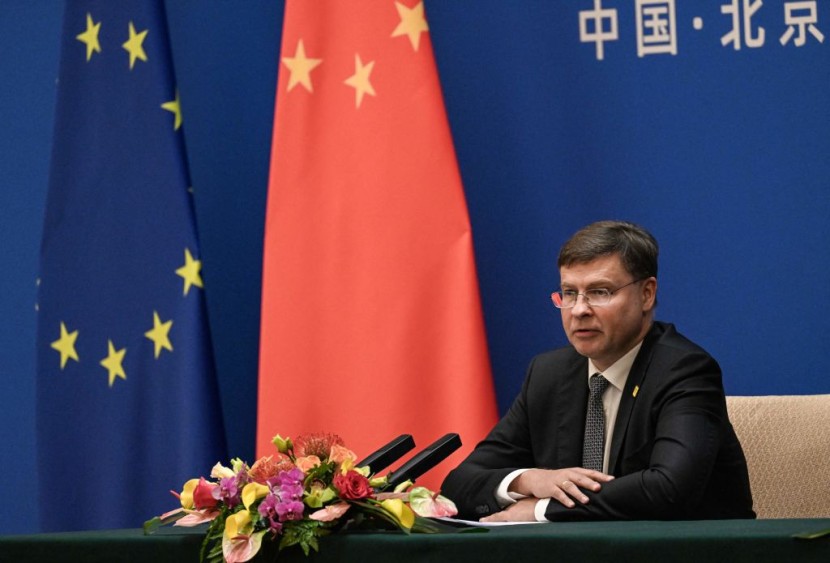
The European Union's Commissioner for Trade, Valdis Dombrovskis, delivered a strong message during his visit to Beijing.
China's unfair trade practices have compelled the EU to take a more assertive stance in its dealings with the world's second-largest economy, as per the Financial Times.
EU Trade Commissioner Takes Firm Stand Against China's Unfair Trade Practices
While emphasizing the importance of their relationship, Dombrovskis stressed the need for reciprocity and fairness in trade. Dombrovskis made these remarks during a keynote speech at Tsinghua University, where he outlined the EU's concerns regarding the trade imbalance and other pressing issues in their economic relationship with China.
While Europe does not intend to severe ties with China or pursue self-sufficiency, it is determined to address the existing disparities.
"We urge China to address the lack of reciprocity in our economic relationship," Dombrovskis emphasized.
Tensions have been escalating between the EU and China on multiple fronts, including trade imbalances and geopolitical issues. Last year, the EU recorded a staggering trade deficit of 396 billion euros ($421 billion) with China, which EU Ambassador to China Jorge Toledo called the highest in the history of mankind.
Half of this deficit stemmed from the automotive and machinery sectors, with the remainder attributed to various manufactured goods, chemicals, and energy. One of the recent sources of friction between the two economic giants is an EU investigation into China's state support for electric vehicle (EV) manufacturers.
The surge in imports of Chinese cars has raised concerns about the future of European auto manufacturers. In response, China's commerce ministry labeled the investigation blatantly protectionist. The tech sector has also witnessed tensions, with China imposing export restrictions on two semiconductor materials, signaling its discontent with Western limitations on advanced chipmaking technology access.
Moreover, the EU has expressed broader concerns about the business environment for European companies operating in China, particularly concerning transparency, access to procurement, discriminatory standards, security requirements, and data localization.
Dombrovskis highlighted China's recent legislative changes, such as the foreign relations law and the broadened counter-espionage law, as great concern to European businesses. Due to their ambiguous nature, these changes have created uncertainty and challenges for foreign companies operating in China.
The EU Trade Commissioner cited a survey conducted by the EU Chamber of Commerce in China in June, indicating that nearly two-thirds of respondents found doing business in China increasingly challenging. The survey also revealed a significant increase in companies reporting revenue decreases compared to the previous year.
Dombrovskis urged China to remain open to facilitate its transition from an investment-led economy to a more diversified and sustainable one. He emphasized that adopting the opposite approach could hinder China's much-needed economic rebalancing, according to CNN.
Read Also : [Update] Philippines Removes Chinese-Built Floating Barrier in Disputed South China Sea Region
EU Trade Commissioner Notes Strong Russia-China Economic Ties Amid Ukraine Crisis
Additionally, Dombrovskis touched on China's position concerning Russia's invasion of Ukraine. He highlighted the growing economic ties between Russia and China, with trade between the two countries surging by 40% in the first five months of the year.
As Russia becomes more reliant on China, its economic relationship with the EU faces significant challenges. In a complex global landscape, the EU's trade relationship with China is evolving, with both sides seeking to navigate trade imbalances, technological competition, and geopolitical considerations.
The EU's call for fairness and reciprocity reflects its commitment to ensuring that the economic relationship benefits both parties while addressing areas of contention, News18 reported.








